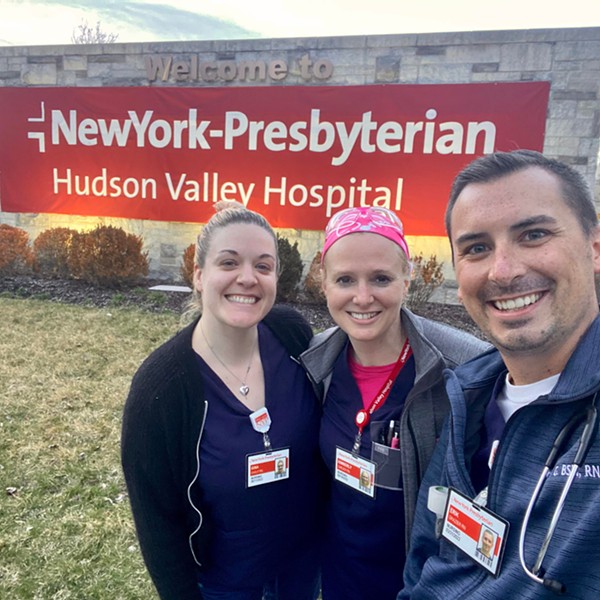At the doorway of the Margaretville Liquor Store, there’s a gallon-size pump dispenser of hand sanitizer and a sign requesting customers use it before stepping inside. Just two in the shop at a time, please, and wear your mask. If that’s too much of a burden, Steve Yaekel, the store’s 68-year-old proprietor, will step out from behind the Plexiglas partition and serve you on the sidewalk.
It’s been a long year. Steve would like to see his grandchildren.
A couple of Sundays ago, Steve and his wife, Melanie, left the house early, headed for the nearest COVID-19 vaccination site they could find an appointment at. Because Melanie won’t be 65 until Valentine’s Day, she can’t schedule an appointment via New York State’s registration system. But after spending hours trying, the Yaekels were able to get Steve a coveted appointment in Potsdam—240 miles away. It’s a four-hour drive each way.
“We thought if there was an opportunity, we’d grab the opportunity,” Steve says.
Vaccine supply is tight across the state and the nation. But Delaware County is in an even more precarious position. The elderly have been eligible for vaccination in New York State for nearly a month, but in all that time, there have been no vaccines available for seniors anywhere in the county—or at least, none advertised.
The Margaretville Hospital, one of three tiny critical-access hospitals in the county, is keeping a long list of elderly people who want to be vaccinated. Some have received appointments, but the list has been promoted only by word of mouth. Westchester Medical Center, the network that owns and operates the hospital, responded to repeated questioning by The River about vaccinations at Margaretville Hospital with a statement saying the hospital is keeping a standby list in case extra vaccines become available.
The nearest state vaccination site is in Albany, more than an hour’s drive for most residents, and appointments that open up there are typically snapped up within minutes. For people like Yaekel—worried about his own health and the customers he faces every day—the surest route to a shot is a long trek up to the North Country in deep winter.
In early January, when New York State opened vaccine eligibility to essential workers and the elderly, Delaware County officials began laying plans to vaccinate the newly eligible. The county’s public health department is tiny and stretched thin, even by rural standards, so it turned to the county Office for the Aging for help. The office began advertising a waitlist for seniors who wanted vaccination. It quickly grew to 1,500 names.
Then Governor Andrew Cuomo and state health officials delivered a surprise to counties: Vaccination of the elderly would be done by pharmacies. County health departments must focus their efforts on essential workers, and hospitals must focus on healthcare workers. Any provider that strays from the state’s instructions might risk being cut out of future distributions.
The state edict threw the county’s waitlist into limbo. Weeks went by, and none of the county’s pharmacies received any vaccine. In nearby Sullivan and Schoharie counties, health departments with more staff and resources were able to get permission from the state to do some vaccination of the elderly. But Delaware County’s tiny public vaccination clinics remained closed to seniors.
“The seniors are being left out of the picture here. It’s becoming a little unnerving,” says Terri Whitney, director of Delaware County’s Office for the Aging.
The county’s waitlist has become an organizational nightmare. Whitney and her staff are in the process of going through each of the 1,500 seniors on the list, and telling them that the list will not enable them to make an appointment at a county clinic. Instead, the OFA is now helping seniors one by one to navigate the labyrinthine system of signing up for a vaccine appointment. With no vaccine available in the county, and no central organizing system connecting the maze of state, county, and private providers beyond Delaware County’s borders, it’s a monumental task.
This week, Whitney finally got the word: Two Walgreens pharmacies in Delhi and Stamford were slated to receive doses from New York State.
Although it’s welcome news, the arrival of pharmacy vaccination in Delaware County has introduced a new puzzle for seniors and their advocates to solve. To make an appointment for vaccination at Walgreens, you must first sign up for an account on Walgreens.com. The site uses an identity verification quiz, and frequently fails to verify applicants, leaving them in limbo and unable to access the appointment scheduling tool.
On Thursday morning, Walgreens opened up 100 appointments at each of its two Delaware County pharmacies. They were gone within minutes. Whitney and her staff were able to help their clients get just six.
Thrust into a new public health role, the Office for the Aging has rapidly become a clearinghouse of vaccine information. But even gathering information for seniors has been a challenge. Officials at the county’s Public Health department are reluctant to put anything in writing, even to their colleagues in county government. The state has been uncommunicative.
“We’re trying to figure out how we can carry this, and to what extent we are alone in this battle,” Whitney says.
In a cruel twist of bureaucracy, Office for the Aging workers who visit homebound seniors are not eligible for vaccination, Whitney says, even though their peers who do home visits for the Department of Social Services are.
The task of helping elderly county residents get vaccinated has been made vastly more difficult by the state’s tight grip on the process. “They’ve created a monster. It can’t be handled, the way they’ve got it going,” she says.
But Whitney isn’t backing down from the fight. There’s too much at stake. Delaware County is increasingly gray: About a quarter of county residents are over 65, compared to 16 percent statewide. Pandemic deaths have accelerated in recent weeks: The county’s cumulative toll, which stood at 10 on Christmas, is now 38 and counting. Few elderly residents are able to face the logistics of an eight-hour round-trip trek to Potsdam. Some would struggle to make it to a clinic in the next town over.
“One staffer said we should never have gotten involved in this,” Whitney says. “I said, ‘No. This is where we need to be. We’re meant to be doing this. Everything else gets tossed to the side, this is what we're doing.’”


















